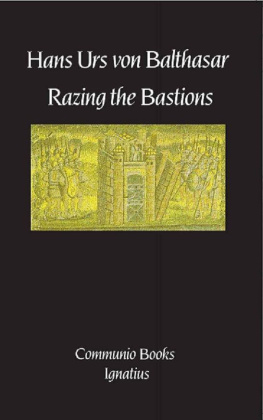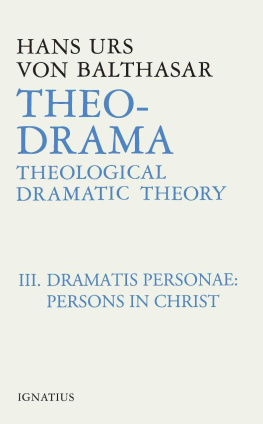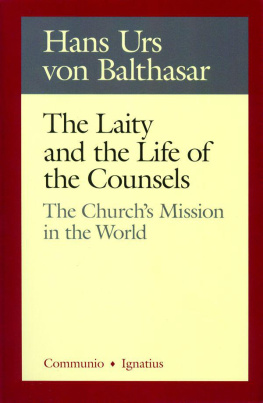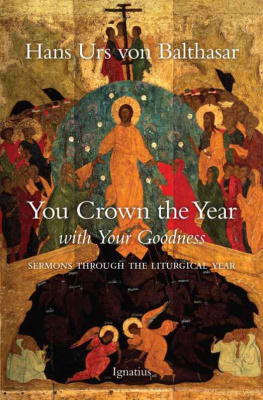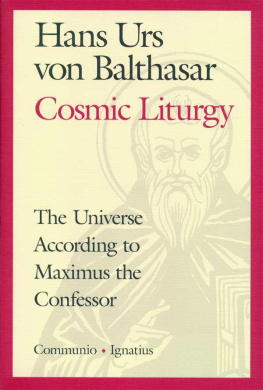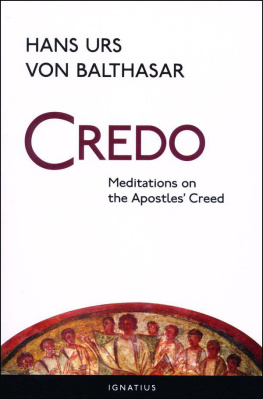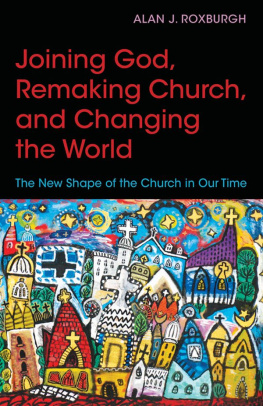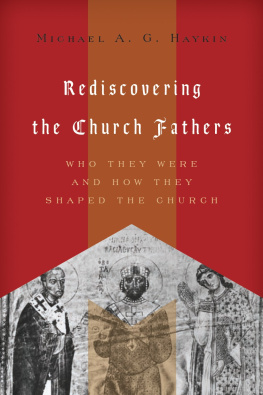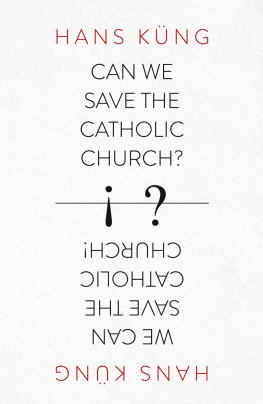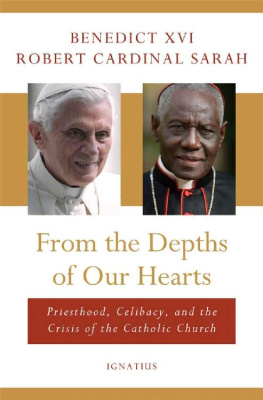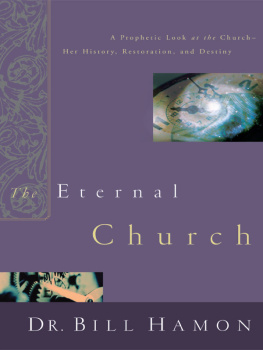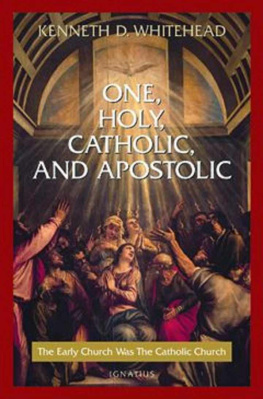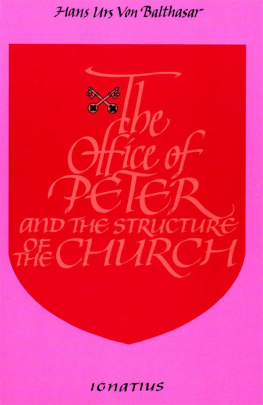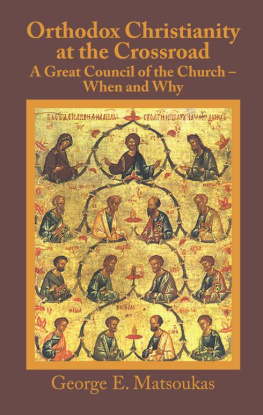RAZING THE BASTIONS
HANS URS VON BALTHASAR
RAZING THE BASTIONS:
ON THE CHURCH IN THIS AGE
With a Foreword by
Bishop Christoph Schnborn, O.P.
Translated by Brian McNeil, C. R. V .
COMMUNIO BOOKS
IGNATIUS PRESS SAN FRANCISCO
Title of the German original:
Schleifung der Bastionen:
Von der Kirche in Dieser Zeit
1952 Johannes Verlag, Einsiedeln
Published with ecclesiastical approval
Cover art: Conquest of Jericho , S. Maria Magiore, Rome
Scala / Art Resource, New York, K25232
Cover design by Roxanne Mei Lum
1993 Ignatius Press, San Francisco
All rights reserved
ISBN 978-0-89870-428-0
Library of Congress Catalogue number 92-75071
Printed in the United States of America
CONTENTS
by Bishop Christoph Schnborn, O.P.
FOREWORD
Hans Urs von Balthasar himself described Razing the Bastions as a programmatic little book, and it has also been broadly understood as such. This captivating book, written with passionate verve, was very often set in opposition to von Balthasars later development in the years after the Second Vatican Council. Razing the Bastions was seen as presenting the program of a Christianity open to the world, whereas after the Council von Balthasar was considered to have sounded the trumpet for the Church to retreat into the inner room. It cannot be the business of this short foreword to take a position in such polemics, distributing labels like progressive or conservative, defending the book or locating it politically. It is more important to hear again, and afresh, the summons to raze the bastions and to meet today the claim formulated here.
Razing the Bastions pleads for a Church that interprets the signs of the age, grasps them and answers them, allowing herself to be awakened by the (Holy) Spirit and by the age from the bed of historical sleep for the deed of today ().
Whither is the Spirit driving the Church, what is he saying to the Bride (Rev 2:7; 22:17)? A new Catholic attitude must be learned (). This, in key phrases, is the program.
Von Balthasar himself pointed out, in a conversation with Angelo Scola in 1985, that the Second Vatican Council (naturally without regard to me) adopted much of this program and deepened it and taught it. In this same conversation, von Balthasar also said, with unmistakable clarity, that he still stands fully by the contents of Razing the Bastions . How is it then that his statements from the period after the Council were felt by many to be opposed to his book of 1952? Had von Balthasar changed course in the interval? Had he experienced himself, now that many of his ideas had been taken up by the Council, a measure of anxiety in face of his own courage?
In Rechenschaft 1965 (In Retrospect), the sixty-year-old von Balthasar explained what was often interpreted as a turning away from his earlier openness to the world. He writes there:
At that time came my programmatic little book Razing the Bastions , the final and already impatient blast of the trumpet calling for a Church no longer barricaded against the world. The blast did not die away unheard, but now it forced the trumpeter himself to reflect more deeply.Indeed it was not as though we were unaware that with an opening to the world, an aggiornamento , a broadening of the horizons, a translation of the Christian message into an intellectual language understandable by the modern world, only half is done. The other halfof at least equal importanceis a reflection on the specifically Christian element itself, a purification, a deepening, a centering of its idea, which alone renders us capable of representing it, radiating it, translating it believably in the world.
And then he writes, with unmistakable clarity:
The last ten years have shown inexorably that the most dynamic [Christian] program of openness to the world remains one-sided (and hence becomes exceedingly dangerous) if it does not cultivate with growing awareness its own distinctive counterpoise and balance: whoever desires greater action needs better contemplation; whoever wants to play a more formative role must pray and obey more profoundly; whoever wants to achieve additional goals must grasp the uselessness and futility, the uncalculating and incalculable (hence unprofitable) nature of the eternal love in Christ, as well as of every love along the path of Christian discipleship....Every program of mission to the world must at all times contain what Guardini called the discernment of what is Christian (p. 52).... For this reason, lest everything in the Church become superficial and insipid, the true undiminished program for the Church today must read: the greatest possible radiance in the world by virtue of the closest possible following of Christ ().
The discernment of what is Christianthis could serve as the heading for much of what von Balthasar wrote after the Council, for example his Elucidations , his Moment of Christian Witness , his Christian Meditation . But this concern is not at all new in von Balthasar. In a certain sense, the discernment of what is Christian is the fundamental trait of his whole oeuvre, from the Apocalypse of the German Soul (1937-1939) onward. When, with inconceivable intensity and breadth, he questions writers from the classical period to the present daypoets, mystics, philosophers and theologiansabout their ultimate attitudes, what is at stake is always the question Christ poses to each man in a wholly unique, unmistakably personal way: But you, who do you take me to be? (Mk 8:29). Discernment is essential: what is involved is the decision that determines ones life: Whoever confesses me in the presence of men, I will also confess him in the presence of my Father in heaven (Mt 10:32).
Von Balthasars oeuvre is a passionate confession of faith in what is central: in Christ as the power of God and the wisdom of God (1 Cor 1:24), in Christ who was crucified, a stumbling block for the Jews, folly to the Gentiles (1 Cor 1:23).
For the Christian this event forms the very center of existence, and he sees everything of any consequence in this world as gravitating toward it.... For the Christian there is no neutral form of existence, which is not affected or illuminated by the mystery of absolute love, and whose fortuitous and doubtful nature is not justified or made meaningful by it.... Why? Because God became flesh ( Moment of Christian Witness , p. 30).
flesh that was visible, tangible, bodily and therefore unavoidably concrete. The appearing of the goodness and love for men of God our Savior (Titus 3:4) brings history and every individual into a situation of decision. Von Balthasar developed this theme not only in his works on the theology of history; unwearyingly and up to the very close of his life, in numerous retreats in the spirit of Saint Ignatius, he also helped people to make the decision of faith for Christ, the discernment in their choice of life: Here... is what it means to be a Christian in its primordial sense: effective hearing of the Word who calls and growth in freedom for the expected response ( My Work , p. 52).
Von Balthasars closeness to the Reformation too lies in this pointing toward the obedience of faith, practiced in the retreats and reflected upon repeatedly in the theological work. He says this himself: It is here, too, that we came closest to the sense and inspiration of the Reformation, from Luther to Karl Barth (ibid.). Too little attention, in my opinion, has been paid as yet to the supreme significance of von Balthasars work for a profound reception of the inspiration of the Reformation. Here lies a great ecumenical task waiting to be done!
But the discernment of what is Christian also means enduring and embodying the whole breadth of what is Catholic: to affirm and to know the fullness of the tradition, without which the Church would not be the Catholic Church, and at the same time to have the power to grasp clearly todays mission for the Church of todays times, and to tackle this mission without succumbing to exhaustion (). Von Balthasar belonged without doubt to this group. When one looks back, one may say that, in a supreme and exemplary manner, in his writing and in his activities, he himself incarnated the program of a Catholicity without defensive bastions.
Next page
